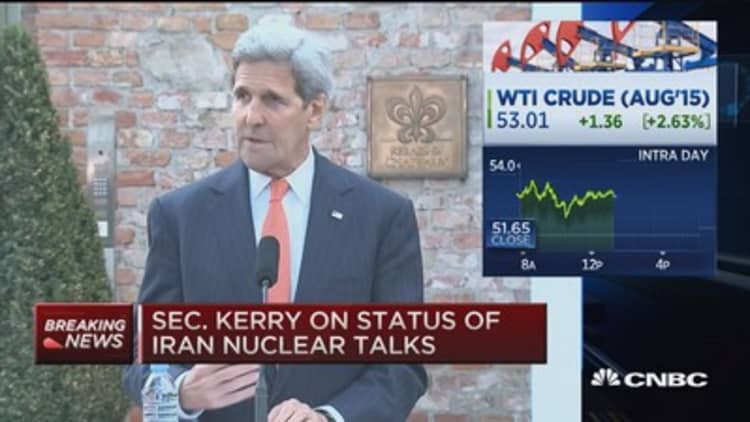
Secretary of State John Kerry said Thursday that major progress has been made in nuclear talks with Iran, but "some of the tough issues remain unresolved." (Tweet this)
At a news conference in Vienna, Kerry said the goal is to reach an agreement that will last decades, but "we are not going to sit at the negotiating table forever."
"Given that the work here is very technical and the stakes are very, very high, we will not rush and we will not be rushed," he said. "All that we are focused on is the quality of the agreement, and that is what will continue to define our work."
Read MoreIran nuclear deal: These industries could get a boost
The negotiations are about restricting Iran's nuclear program to nonmilitary usage in return for sanctions relief. Crude oil futures pared gains after the White House said Iranian talks can continue as long as there is "genuine commitment."
Iran is seeking to restore oil exports that have dropped from 2.5 million barrels per day in 2011 to about 1 million in 2014 due to Western sanctions arising from its controversial nuclear program.
Moments before Kerry made his statement, Iranian Foreign Minister Mohammad Javad Zarif sent the following tweet:
A historic nuclear agreement could resolve a 12-year dispute over Tehran's nuclear ambitions. Negotiations have taken place in recent months between Iran and the U.S., Britain France, Germany, Russia and China over how Tehran would curb sensitive nuclear activities for more than a decade in exchange for sanctions relief.
Over the past two weeks, negotiations were deadlocked on the issue of Iranian arms and missile trade. The deadline for completing a long-term deal was twice extended.
The deal must be sent to the U.S. Congress by midnight Thursday EDT to secure a 30-day review period by the Republican-dominated body. If the agreement is sent after Thursday, the review period will be doubled to 60 days, increasing the chance that the deal could unravel.
Read MoreOil crushed by worries on Europe, Iran
A deal would be a political success for President Barack Obama and Iran's President Hassan Rouhani, both of whom face skepticism from hardliners in their respective countries.
Kerry and Zarif have been meeting daily for two weeks to overcome the last remaining obstacles. French Foreign Minister Laurent Fabius and his British and German counterparts have also rejoined the negotiations.
—Reuters contributed to this report.


